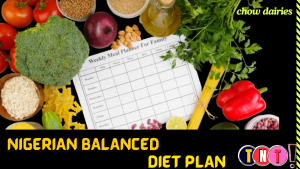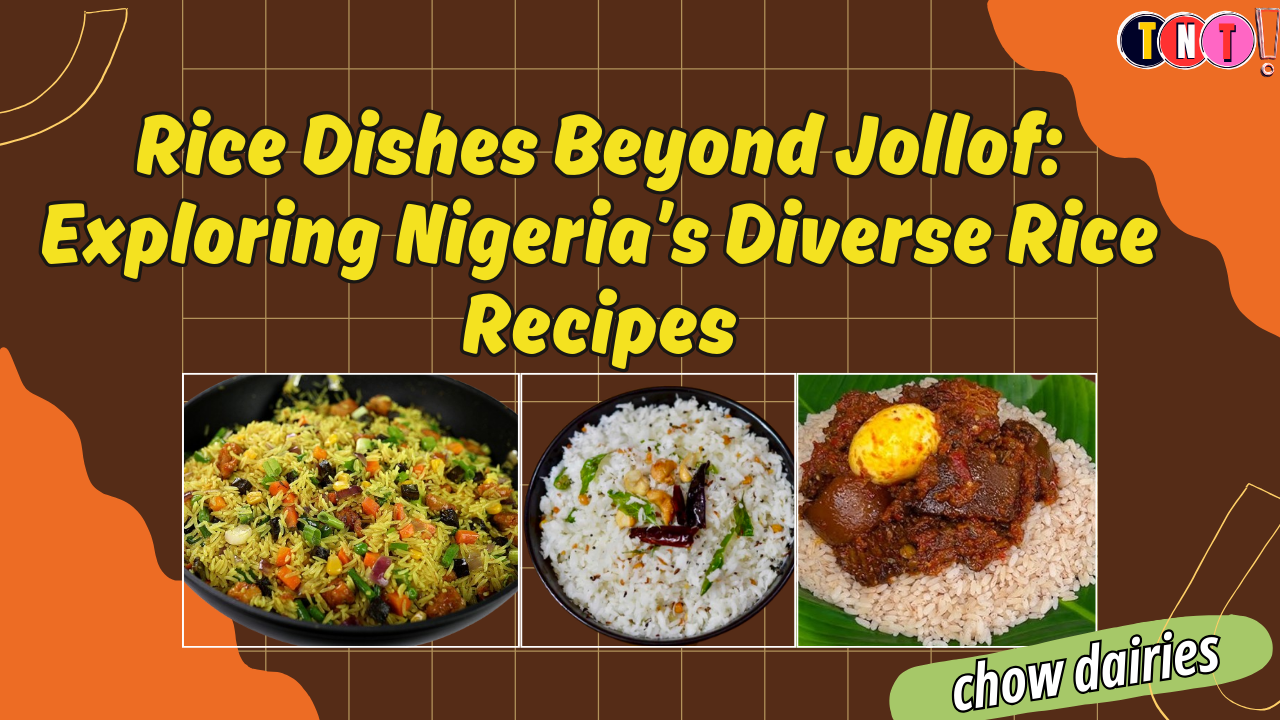Nigerian balanced diet plan for the entire family is essential for promoting good health, supporting children’s growth, and preventing chronic diseases. However, for many Nigerian families, the challenge lies in finding a meal plan that caters to everyone’s tastes, dietary needs, and even our beloved local dishes.

In this guide, we’ll explore how to create a balanced diet plan that includes a mix of traditional Nigerian meals and modern twists, ensuring everyone from the youngest to the oldest enjoys nutritious and tasty food every day.
Why a Balanced Diet Plan Matters for Nigerian Families
In Nigeria, food is more than just sustenance it’s a celebration of our culture and heritage. But beyond the enjoyment of jollof rice, pounded yam, and egusi soup, a balanced diet is crucial for keeping the family strong and healthy. Eating well can help prevent health problems like obesity, hypertension, and diabetes, which are becoming more common in our society. For children, a well-structured diet promotes strong bones, healthy brain function, and the energy to stay active. For adults, it helps manage weight, enhances immunity, and reduces the risk of chronic illnesses.
Benefits of a Balanced Diet Plan for Nigerian Families
- Better Health Outcomes: Lower risk of lifestyle diseases like hypertension and diabetes.
- Improved Energy Levels: Fuels daily activities, whether at school, work, or home.
- Supports Healthy Growth in Children: Promotes development and learning.
- Strengthens Family Bonds: Mealtime is an opportunity to connect and share stories.
Nutritional Needs by Age Group
Infants (0-2 years)
- Primary Source of Nutrition: Breast milk or infant formula.
- Introducing Solid Foods: Around six months, add pap, mashed sweet potatoes, and pureed vegetables.
Children (2-12 years)
- Nutritional Focus: High-energy foods rich in calcium, iron, and vitamins.
- Suggested Foods: Moi moi, akara, rice and beans, eba with okro soup, and a variety of fruits.
Teenagers (13-18 years)
- Nutritional Needs: Increased protein, iron, and folate for growth and development.
- Recommended Foods: Ofada rice, grilled chicken, yam porridge, beans, and leafy vegetables like ugu.
Adults
- Nutritional Focus: Balanced macronutrients (proteins, carbohydrates, fats) and micronutrients.
- Important Foods: Lean proteins like fish, healthy fats like groundnut, and high-fiber foods like millet and plantain.
Elderly
- Nutritional Considerations: Higher intake of calcium, vitamin D, and fiber.
- Foods to Include: Fortified ogi, unripe plantain porridge, and easy-to-digest vegetables like ugu and waterleaf.
Key Ingredients of a Balanced Diet (With Naija Options)
Proteins
- Function: Build and repair tissues, support immune function.
- Sources: Egusi, fish, beans, snails, moi moi, kpomo.
Carbohydrates
- Function: Primary source of energy.
- Sources: Yam, garri, pounded yam, tuwo, amala, jollof rice.
Fats
- Function: Supports cell function and absorbs nutrients.
- Healthy Sources: Palm oil, groundnut, avocado, egusi, and coconut.
Vitamins and Minerals
- Purpose: Regulate body processes like bone health and immunity.
- Sources: Ugu, waterleaf, scent leaf, okro, and a variety of fruits like pawpaw, mango, and agbalumo.
Fiber
- Function: Aids in digestion and regulates blood sugar levels.
- Sources: Oats, whole grains, fruits like orange and pawpaw, and legumes like beans.
Water
- Purpose: Maintains hydration and supports metabolism.
- Daily Recommendation: At least 8 glasses for adults and 5-7 glasses for children.
Steps to Create a Family-Friendly Nigerian Meal Plan
- Identify family members’ dietary restrictions, allergies, and preferences.
- Note specific nutritional requirements, like iron for teens and calcium for elders.
- Include garri, beans, fish, vegetables, and fruits in each meal.
- Rotate recipes with traditional dishes like abacha or afang soup to ensure variety.
- Use smaller portions for children and balance proteins, carbohydrates, and vegetables.
- Create a weekly menu featuring akara and ogi for breakfast, jollof rice for lunch, and yam porridge for dinner.
- Let children help wash vegetables, select fruits, or stir the egusi soup to create a sense of ownership.
Sample of 7-Day Nigerian Family Meal Plan
Day 1:
- Breakfast: Ogi with akara and banana slices.
- Lunch: Jollof rice with grilled fish and a side of dodo (fried plantain).
- Dinner: Eba with egusi soup, including ponmo and spinach.
- Snack: Garden egg with groundnut paste.
Day 2:
- Breakfast: Scrambled eggs with agege bread and a glass of zobo.
- Lunch: Ofada rice with ayamase stew and coleslaw.
- Dinner: Beans porridge with roasted plantain (Boli).
- Snack: Sliced cucumber and groundnuts.
(Continue with meal suggestions for the rest of the week, incorporating Nigerian dishes and fresh produce.)
Tips for Maintaining a Balanced Diet Long-Term
- Plan for Grocery Shopping: Buy seasonal vegetables like ugu or bitterleaf to save costs.
- Prep in Advance: Cook soups in bulk and freeze for busy weekdays.
- Limit Processed Foods: Use fresh ingredients instead of canned options.
- Experiment with New Recipes: Try less common soups like edikang ikong or oha.
Common Mistakes to Avoid When Planning Family Meals
- Ignoring Portion Sizes: Overloading plates can lead to overeating.
- Skipping Breakfast: Missing the most important meal of the day affects energy levels.
- Using Too Much Palm Oil: Opt for healthy portions to balance fats.
- Neglecting Hydration: Encourage drinking zobo, kunu, or plain water instead of sugary drinks.
Conclusion
Creating a balanced diet plan for the whole family doesn’t have to be difficult, even with our rich and diverse cuisine. With careful planning, understanding nutritional needs, and incorporating a variety of local foods, you can promote health and happiness for everyone. Make mealtime a joyous occasion and a chance to nourish both the body and family bond. Start planning today, and watch as your family enjoys delicious, balanced meals!



